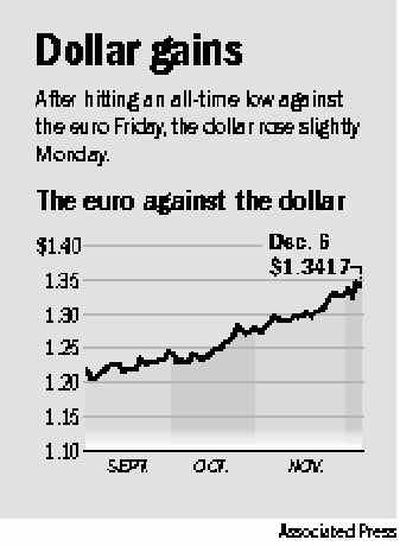As dollar declines, Europeans see U.S. as a big half-off sale

Tom Scullion, a taxi dispatcher in London, had his eye on a three-button Hugo Boss suit he saw for sale there for 850 pounds. He didn’t buy it.
But on a recent trip to Florida, Scullion went shopping at Saks Fifth Avenue, where he spotted the very same suit and bought it. It was a steal at $522, the equivalent of 300 pounds at the time.
“I couldn’t believe how inexpensive it was,” he says. During a three-week U.S. vacation, “we just shopped and shopped and shopped.”
As the dollar has fallen to a 12-year-low against the British pound and an all-time low against the five-year-old euro, Europeans now view the U.S. as one giant half-off sale on everything from clothes to coffee to restaurant meals. Because so many businesses now operate globally, comparison shopping is easy.
At the London outpost of Nobu, the New York Japanese restaurant, a special set meal costs between $136 and $233 per person, at Friday’s exchange rate of $1.94 to the pound. That’s out of the question for Catherine Watson, a 38-year-old photographer from Cardiff, Wales — except when she can snap up cheap dollars to pay for the same meal at Nobu in Manhattan. There, the chef’s special dinners are $80, $100 and $120, about 40 percent off London prices.
“Things seem so cheap that you turn into a bit of the child in a candy store,” says Watson.
The hordes from the Old World streaming across the Atlantic are likely only to increase as the dollar, down about 10 percent against the pound and down 12 percent against the euro since April, is expected to fall further in 2005. Basic goods, such as household supplies, clothing and food have long tended to be less costly in the U.S., where sales and big discount chains are more prevalent than in Europe. But the disparity currently is much greater. And businesses, from airlines to hotel chains, are stepping up promotional efforts to portray the U.S. as a shopper’s paradise.
Travel from some European countries to the U.S. is up nearly 25 percent so far this year, says Gabriella Vecchio, international marketing manager at the Travel Industry Association of America.
That pace well exceeds the forecast that the U.S. Department of Commerce office of travel and tourism industries made last April for 9.3 million Europeans to visit the U.S. this year, a 7 percent increase from 2003. American Airlines says its trans-Atlantic flights are 81.3 percent full, up 3.9 points from a year ago, and it has added flights as well. In London subway advertising, the airline’s slogan is: “America Reduced.”
“A weak dollar means bargain holidays,” declared a recent article in London’s Sunday Times. Other travel sections of British newspapers are filled with stories detailing how Christmas shopping in Manhattan promises savings even after hotel and airfare costs.
According to the U.K. Daily Mail’s two-page spread of price comparisons, the Gap’s funky fake-fur vest sells for $68 in Manhattan, nearly half the $132 price in London. At the Apple Store in Manhattan’s SoHo, a pastel mini iPod digital music player, which holds 1,000 songs, sells for $249, compared with about $347 at Apple U.K.
With the rush of U.K. tourists, the U.S. Department of Commerce is about to start a $6 million marketing campaign in the U.K. to promote U.S. travel. Some restaurants and hotel room-service operations in tourist cities including Washington, Charleston, S.C., and Miami also are going out of their way to cater to the rush. Florida’s Portofino Bay Hotel recently added crumpets and HP steak sauce to the breakfast buffet. Dolly Parton’s Dixie Stampede dinner theater in Orlando just started serving beer specifically to get more U.K. traffic, managers say. New at the Ritz-Carlton in South Beach: topless sunbathing at the pool to help lure guests with a Mediterranean mindset.